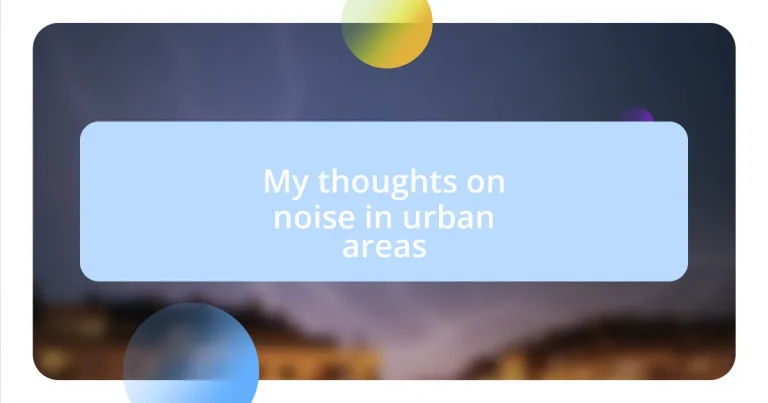Key takeaways:
- Urban noise significantly impacts mental and physical health, leading to issues like sleep disturbances, increased stress, and cognitive impairment.
- Sources of urban noise include traffic, public transport, construction, and street performers, which can detract from the quality of life in cities.
- Effective strategies for reducing noise include creating green spaces, using noise barriers, and implementing strict noise management policies.
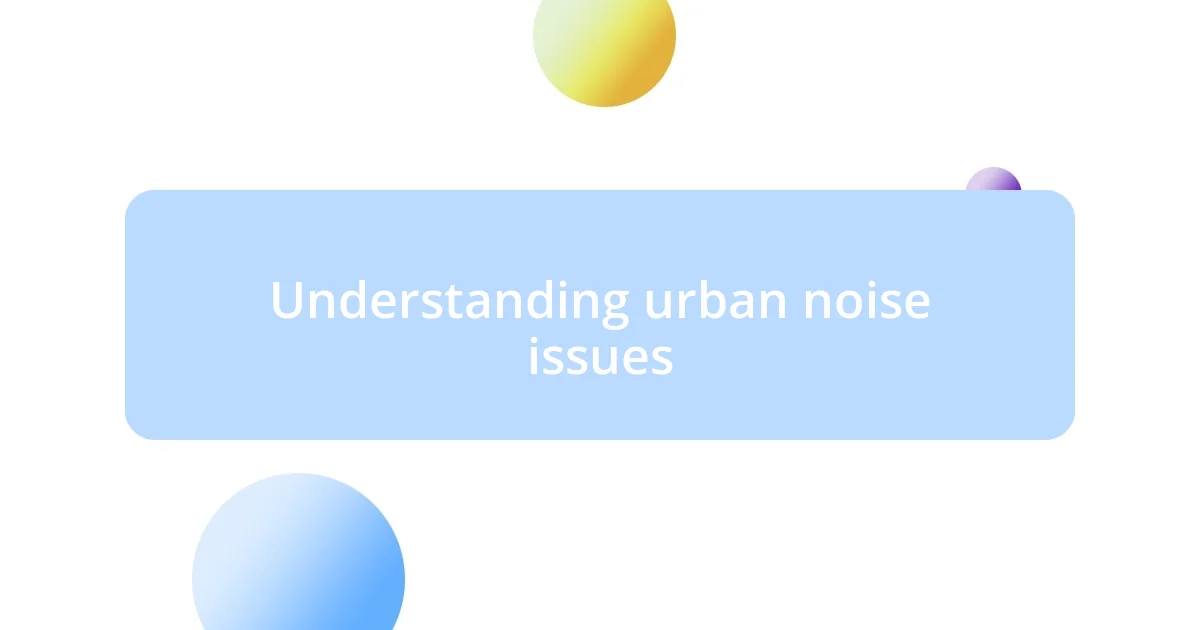
Understanding urban noise issues
Urban noise is often a background character in our daily lives, yet it plays a significant role in shaping our experiences. I remember walking through downtown on a bustling afternoon, surrounded by honking cars, chatting pedestrians, and the commotion of construction. It struck me then—how often do we stop and notice the cacophony around us? This constant sound can often feel overwhelming.
In my experience, the impact of urban noise isn’t just physical; it seeps into our mental landscape, affecting our mood and productivity. I once tried working in a coffee shop near a busy street, thinking the vibe would inspire creativity. Instead, I found myself distracted by the relentless roar outside, and my productivity plummeted. Isn’t it fascinating how something as ubiquitous as noise can alter our state of mind so dramatically?
We often dismiss noise as simply an annoyance, but studies have shown it can lead to stress and health issues, too. The cumulative effect of that daily din can wear you down over time. Have you ever noticed how even your conversations are affected? Sometimes, we have to raise our voices just to be heard above the clamor, which can leave us feeling drained instead of energized.

Impact of noise on health
Urban noise can significantly impact our overall health, and it’s something I think we often underestimate. I learned this firsthand after living in a neighborhood lined with busy roads. The constant influx of honking horns and revving engines began to invade my sleep, causing chronic fatigue and irritability during the day. It’s remarkable—and somewhat disheartening—to realize that something as seemingly innocuous as background noise can disrupt our fundamental well-being.
Research reveals the extensive toll of urban noise on health, linking it to various issues such as:
- Sleep disturbances: Chronic exposure can lead to insomnia and difficulty falling or staying asleep.
- Increased stress levels: Noise triggers the body’s stress response, raising cortisol levels, which can lead to long-term health problems.
- Cardiovascular issues: Studies show a connection between high noise levels and increased risk of hypertension and heart disease.
- Cognitive impairment: Persistent noise can affect concentration and memory, making it challenging to work or study effectively.
- Hearing loss: Prolonged exposure to loud urban sounds can damage hearing over time, impacting quality of life.
It makes me reflect on the simple pleasure of a quiet evening at home. I remember a time after moving to a less noisy area, sitting on my balcony and enjoying the serene sounds of nature. That peace was a stark contrast to the urban noise and made me realize how vital a quiet environment is for our health and happiness.
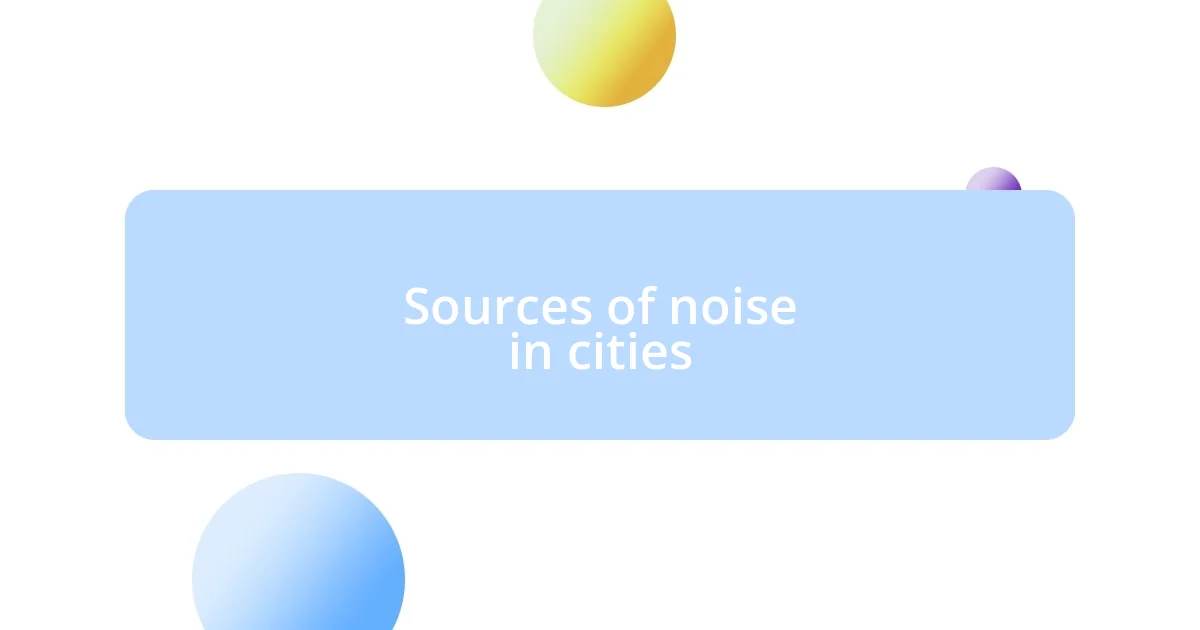
Sources of noise in cities
Urban areas buzz with a symphony of sounds, and not all of them are pleasant. From the ever-present sirens blaring in the distance to the rhythmic clanking of construction sites, I often find myself reflecting on how these noises weave into the fabric of city life. Just the other day, as I strolled past a park, I noticed children laughing and playing, perfectly contrasting with the distant rumble of engine traffic. It’s a vivid reminder that while some noises foster connection, others can be intrusive.
When I think about the sources of noise in cities, public transport always stands out to me. I have vivid memories of riding the subway during rush hour—voices, announcements, and the whoosh of trains all blending into a chaotic symphony that often leaves me feeling overwhelmed. It’s fascinating how this mass transit, designed to promote efficiency and accessibility, ends up contributing significantly to the urban soundscape. In addition to public transport, let’s not overlook street performers or vendors, whose music and voices add another layer of sound, sometimes bringing joy, but at other times, a level of noise that becomes hard to ignore.
All these varied sounds can create a unique atmosphere, but there’s an undeniable downside too. Whether it’s the growl of motorcycles speeding past or the reverberation of construction work echoing at all hours, I wonder how we let these noises infiltrate our daily routines. They can drain our energy and distract us from meaningful interactions, leaving us yearning for moments of peace. My experience emphasizes that understanding and acknowledging these sources of urban noise is crucial; it’s not just about complaint, but about finding ways to navigate this complex soundscape.
| Source of Noise | Description |
|---|---|
| Traffic | Continuous honking and engine sounds from vehicles on busy streets. |
| Public Transport | Noise from subways, buses, and other forms of mass transit, particularly during rush hours. |
| Construction | Sounds of machinery, drilling, and hammering that can persist throughout the day. |
| Sirens | Emergency vehicles frequently generate sudden, loud noises that disrupt the surrounding area. |
| Street Performers | Musicians and vendors contribute to the vibrancy of city life but can also add to the noise level. |
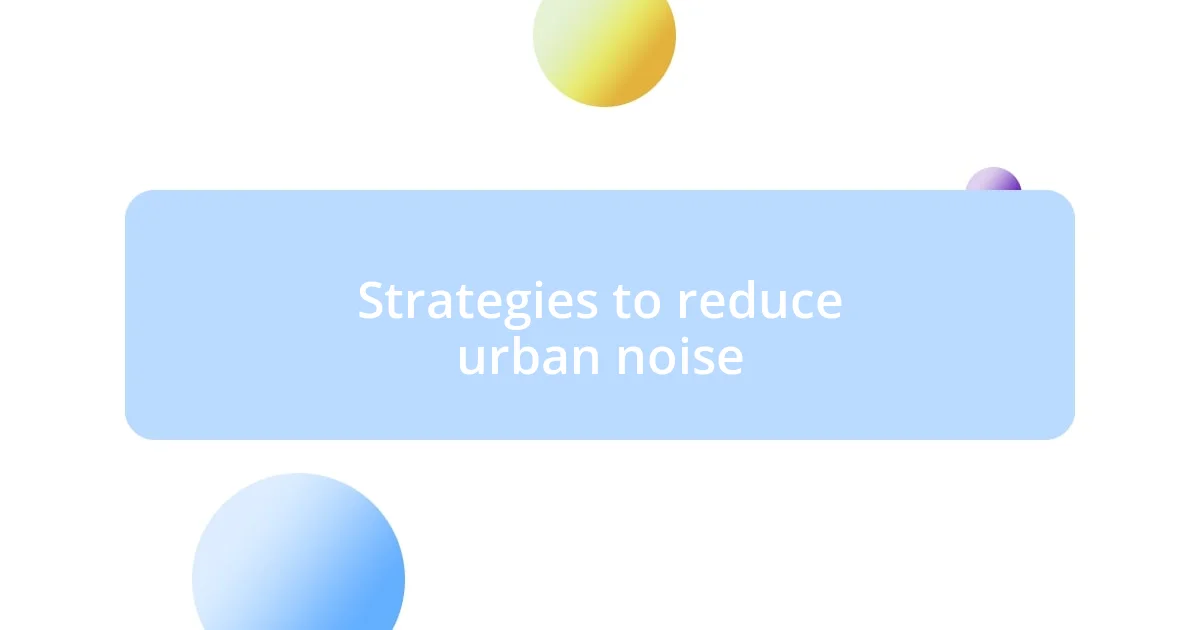
Strategies to reduce urban noise
In thinking about strategies to reduce urban noise, I’ve come across a few intriguing methods that really resonate with me. One strategy that stands out is the implementation of green spaces, such as parks and urban gardens. I remember visiting a community park in the heart of a bustling city, where the lush greenery acted as a natural sound barrier. As I sat there, surrounded by tall trees and vibrant plants, it felt like stepping into a different world, almost shielding me from the chaotic sounds of traffic. Isn’t it amazing how nature can provide such an effective respite?
Another practical approach is the use of noise barriers along busy roads. During my daily commute, I’ve noticed how certain stretches of highways are lined with tall, sound-absorbing walls that significantly diminish the din of rushing vehicles. It’s fascinating how engineering can create more tranquil urban spaces. When I’m driving past these barriers, I actually feel a reduction in stress, turning my commute from a frantic rush into a more pleasant experience. Have you ever noticed how small changes like this can turn a noisy drive into a more peaceful journey?
Lastly, promoting the use of quiet technology in construction and transportation can have a remarkable impact as well. I recall a recent experience with a new bus service that proudly advertised its “quiet” engine. The ride was surprisingly serene, allowing me to actually enjoy the scenery rather than being overwhelmed by noise. It made me wonder why we don’t see these innovations more widely adopted. If we can design our urban environments to prioritize sound reduction, we might just find a better balance between bustling city life and much-needed peace. Wouldn’t that be a refreshing change?

Community efforts to combat noise
When I think about community efforts to combat noise, a few initiatives really stand out to me. I once participated in a neighborhood meeting where residents discussed creating a noise awareness campaign. Everyone shared their personal experiences with noise pollution, which really brought home how impactful these sounds can be on our daily lives. That collective energy gave me hope—we could work together to push for change in our urban environment.
One fascinating project I came across was a local initiative to plant trees in high-traffic areas. As I walked through my neighborhood one afternoon, I noticed the difference those trees made; they not only provided beauty but also acted as a natural sound barrier. I couldn’t help but marvel at how something so simple could transform our experience of the city. Have you ever felt that peaceful ambiance a little greenery can bring?
Moreover, I’ve seen communities collaborate to install “quiet zones” around schools and hospitals. The idea resonated with me personally because I often pass by our local school during drop-off times. Those bright yellow signs asking drivers to slow down and minimize noise felt like a gentle reminder of our responsibility to others. It’s refreshing to see communities prioritize sound reduction, crafting a more harmonious space not just for ourselves, but for future generations too. Wouldn’t you agree that these small actions can lead to a quieter and more enjoyable urban experience?
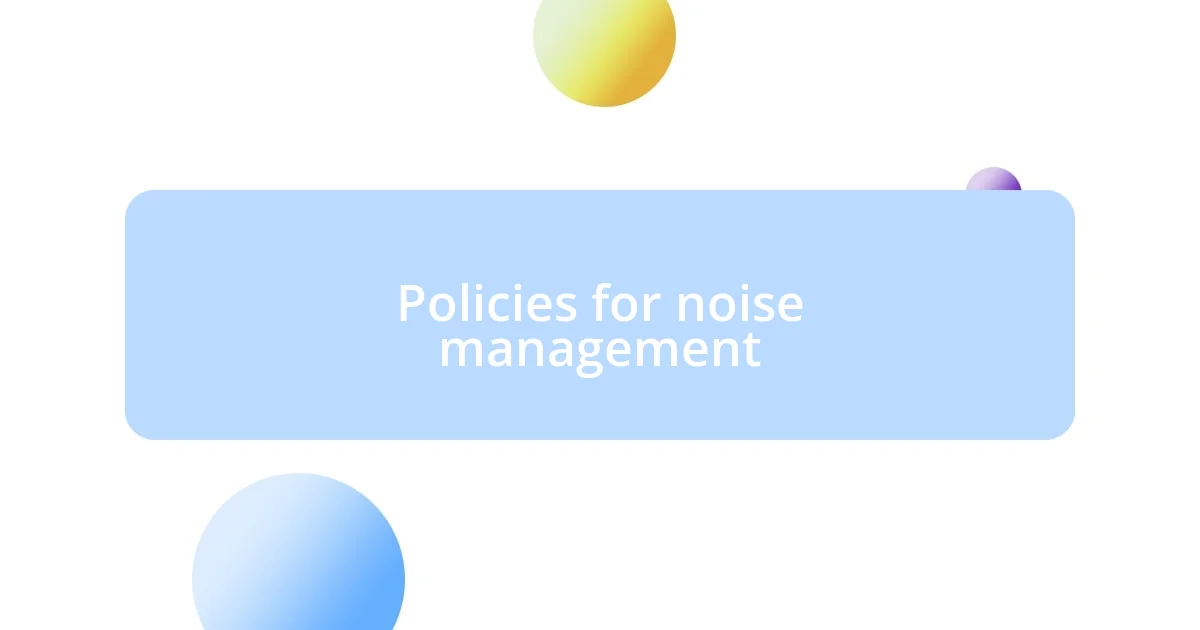
Policies for noise management
Policies aimed at managing noise in urban areas are essential for fostering healthier living environments. I remember a city council meeting where local residents voiced their concerns about excessive noise, which led to the introduction of stricter noise ordinances. Hearing their testimonials made me realize how policies can empower communities to reclaim their peace. Have you ever felt the impact of a well-enforced noise regulation?
One approach that I’ve seen gain traction is the creation of noise zoning laws. These regulations designate specific areas where sound levels are limited, especially near sensitive locations like schools and hospitals. It’s intriguing how simply establishing boundaries can cultivate quieter neighborhoods. I once lived near a vibrant entertainment district, and when they enforced noise restrictions after 10 PM, it transformed our nightly experience dramatically. Who wouldn’t appreciate a good night’s rest, free from disturbances?
Furthermore, financial incentives for implementing soundproofing measures in homes and businesses demonstrate a proactive commitment to noise management. I was pleasantly surprised when a local shop I frequented received a government grant for soundproofing renovations. Walking into that newly renovated space felt like stepping into a sanctuary, allowing conversations to flow more freely without competing with outside noise. Wouldn’t it be wonderful if more places embraced such initiatives to enhance the quality of life for everyone?
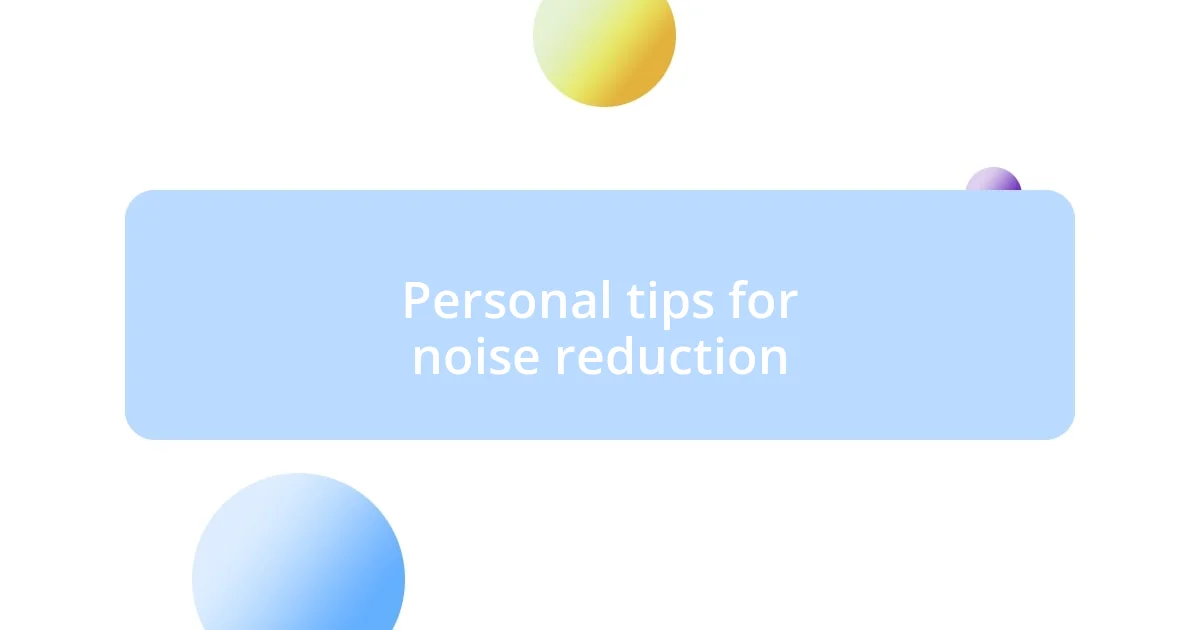
Personal tips for noise reduction
Finding personal strategies for reducing noise can significantly enhance our urban experience. One simple method I’ve embraced is using noise-canceling headphones when I’m working from home. Initially, I was skeptical, thinking the ambient sounds of the city could still seep in, but the moment I put them on, I felt instantly cocooned in my own little bubble of concentration. Isn’t it amazing how effective technology can be in creating our personal oasis even in bustling environments?
Creating a peaceful retreat in your space is another approach I find invaluable. I’ve dedicated a corner of my living room as a quiet zone, complete with soft cushions, a few plants, and a small water fountain. The murmur of water is soothing, and it drowns out the city noises outside. Whenever I settle down with a book there, it feels like I’ve escaped the chaos for just a little while. Have you ever tried setting up a personal sanctuary to recharge?
Lastly, something as simple as practicing mindfulness can be a game-changer in managing noise. I started incorporating short meditation sessions into my routine, focusing on my breath while acknowledging the sounds around me without judgment. It’s surprising how this shifted my perspective; instead of feeling annoyed by honking cars or construction sounds, I began to accept them as part of city life. This practice not only cultivated a sense of calm but also enhanced my overall well-being. How do you cope with the sounds of urban life?












